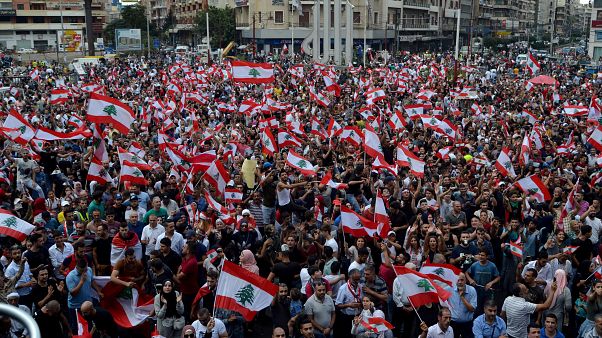Why
Lebanon And Iraq Are
At The Brink Of Further
Strife

29
October, 2019
Today
the Prime Minister of Lebanon Saad Hariri resigned after -at times-
violent protests. In Iraq the gadfly cleric Moqtada Sadr joined
protesters after previous protests in Iraq also led to violence. In
both countries at least some protesters demand the resignation of
their governments. While the demonstrations in both countries are
about local economic and political issues there are foreign actors
involved who want to use them to achieve their own goals.
Elijah
J. Magnier @ejmalrai - 12:37 UTC · Oct 29, 2019
#Lebanon
and #Iraq protestors hitting the "Axis of the Resistance"
stability in these two countries and pushing Prime Ministers in both
countries to resign and lead the country towards instability.
#US
and #SaudiArabia has lost #Syria but are still fighting in other
theatres.
On
October 6 we warned of these 'regime change' attempts : The U.S. Led
Coup Attempt In Iraq May Further Weaken That Country
During
the last five days there have been protest all over the south of Iraq
where the majority of the people are Shia. The protest escalated
within a few days into shootings with over a hundred killed. In
several cities party and government offices were burned and various
groups hustle to take a position in the "leaderless"
movement.
There
are legitimate reasons for protests. The majority of the people in
Iraq are younger than 20. The people have little chance of finding a
job. The state is weak and many of its actors are corrupt. Services
the state is supposed to provide don't get delivered. Electricity and
water supply is often sparse.
But
those are not the reasons why the protests immediately escalated into
violence.
...
The
protests are part of the conflict between the U.S., its Saudi
proxies, and Iran.
The
immediate aim is to bring down the government under Prime Minister
Adel Abdel Mahdi who strove to stay neutral in the conflict between
the U.S./Israel/Saudi Arabia and Iran.
...
New
U.S. sanctions against Lebanese banks who allegedly support Hizbullah
are likewise part of U.S./Israeli/Saudi effort to squeeze Iran and
its proxies ...
An
imminent breakdown of the very weak economy of Lebanon, partially
caused by U.S. sanctions against Lebanese banks and the end of
traditional Saudi subsidies to Lebanon, also led to protests and
today to the resignation of Prime Minister Saad Hariri. He will now
lead a caretaker government which will have too little power to
change anything.
Both,
Iraq and Lebanon, have ethnic-sectarian systems that are finely
balanced. The warlords or clan leaders of the various groups use the
state for their own enrichment. Providing services for the whole
country mean nothing to them. All they want is more money that allows
them to run a system of patronage and clientilism for their immediate
followers which keep them in their positions.
In
Iraq and Lebanon the positions in the parliament and government are
decided (more or less) by group quotas that are difficult to change.
Both countries would be better off under universal constitutions that
would do away with any quotas and specific positions for special
groups.
But
the Christian groups in Lebanon would lose out as the Christian share
of the population has decreased over time. In Iraq the currently
strong Kurdish and Sunni positions would lose power to the Shia
majority. These groups would rather fight than give up on their
privileges.
The
current political systems make any change extremely difficult. The
demonstrators are asking for the corrupt politicians to leave. But
even if the governments resign and call for new elections an
adherence to the election laws and constitutions would only recreate
a similar situation.
To
call for resignations is thereby not the way to achieve change.
The
best strategy for the legitimate protesters is to press the current
governments for reform. The governments in Iraq and in Lebanon have
both already agreed to make certain changes. The protesters should
accept those and pull back. If the politicians do not stick to those
commitments the protesters can always go back into the streets and
demand more.
Unfortunately
there are external actors with lots of money who want to prevent
that. They want to throw both countries into utter chaos or even
civil wars because they hope that it will weaken those factions that
have good relations with Iran.
In
Lebanon there was some violence by followers of the Shia Amal
movement against a protesters tent camp. 'Western' media falsely
attributed the violence to Hizbullah. In Iraq the guards of a
government building in Karbala shot at protesters who tried to breach
its gate. Some 'western' media falsely alleged that those shooters
were Iranians.
But
external actors have made such bids before only to fail to achieve
the wanted results. The outcome of any violent strife now will - in
the end - likely be a different one than they dream of. In both
countries it is likely that, after a bloody and chaotic period, the
groups that will come out on the top will be the very once that the
Saudis, the U.S., and Israel want to push down.
There
would also be a lot of collateral damage and both countries would be
further weakened. That is why the Iran aligned groups are currently
trying to avoid to react to the obvious provocations against them.
But with blood flowing in the streets it will be difficult to adhere
to that position for much longer.



No comments:
Post a Comment
Note: only a member of this blog may post a comment.